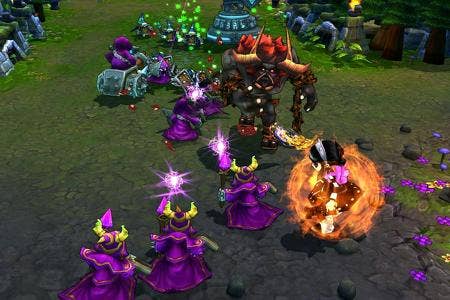Benchmark's Mitch Lasky: The value of publishers "isn't clear"
The investment partner looks into changes in publishing and the mobile market
Benchmark Capital general partner Mitch Lasky has a proven track record of investing in winners, having backed both Riot Games and Gaikai. Riot Games's League of Legends was a large reason Chinese publisher Tencent purchased the developer and could-streaming service Gaikai was recently purchased by Sony. In an interview with VentureBeat at GamesBeat 2012, Lasky covered his views on the future of the industry.
Lasky kicked the interview off by talking about how digital distribution and social networks have lessened the pull of the traditional publisher.
"I think we're in a period right now where it is unclear what a publisher is or does," Lasky began.
"I think the value of what the incumbents offer isn't clear. The incumbents, I think, still believe that they bring a lot of marketing reach to the table in terms of discovery. What we've found is that we're in an era now where it's so frictionless to find things that you want to find - the social media are amplifying hits to a higher degree."
Lasky noted that while user acquisition costs were significant for many, great content tends to pull users in through word of mouth.

"We have Riot Games as an example. Here's a game where we did zero acquisition marketing. We really did very little marketing of any kind for it. And in a period of two years, we have 42 million downloads. That's an enormous captive audience. A company can use that audience to launch new products that lower the cost of acquisition," he said.
"Everyone talks about discovery, but I really believe that great content finds its audience."
On Gaikai's purchase by Sony, Lasky believes the acquisition is part of Sony looking to make the PlayStation brand a full-service platform.
"My hope is that we're going to see PlayStation as a service. Because I think that would be truly revolutionary, and that would really push the boundaries and put a lot of pressure on their competitors," he said.
"I think it means that PlayStation stops being the physical piece of plastic and [that] it starts to be a platform. Maybe it exists in its purest expression in conjunction with the hardware, but there's an aspect of it that's community. There's a catalog of games that transcends that physical hardware and lives in the cloud," Lasky added.
"I think Microsoft is headed in that direction. I think Microsoft's aspirations for Xbox Live are very similar in the sense of going beyond a dedicated Xbox community and making it more ubiquitous."
When it comes to the mobile sector, Lasky explained that companies are still feeling out the space.
"My perspective on mobile has changed a bit. Let's look at Gree and DeNA as an example. Here are two companies in Japan, both of which have peaked at about four billion dollars of market cap. Both of them have portals on feature phones, where they can aggregate large audiences, and big publishers like Konami are publishing through DeNA and Gree," Lasky started.
Gree and DeNA had a problem that's become prevalent to those selling through app-driven mobile OS like iOS and Android.
"Then the smartphone happened, and they kind of had the same problem in a sense that Facebook has with the smartphone, and that is: On the future phone, they were a platform, [but] on the smartphone, they're just a collection of apps."

"It's very hard to have that control of the audience when you're on the top-10 lists or you're on the deck just like everybody else is. There's nothing that is reaggregating that audience for you. So what did they do? They came over and acquired Ngmoco to get access to the Plus+ network and some Android games. They acquired, in the case of Gree [and] OpenFeint, to again provide that kind of meta-audience reaggregation. Because they're trying to replicate on the smartphones what they had on the future phones."
Despite the large hit built-in app stores like the Apple App Store and Google Play Store take off the bottom line, Lasky still finds their services worth the price.
"I think in the case of the 30 percent that you're paying to Apple, you're getting a lot. They're marketing hardware. They're marketing the App Store. They're doing a lot for you. They have credit cards on file so that they can make commerce frictionless. I think that's worth 30 points."
"But I think in terms of some of these other things, your mileage may vary. That said, getting back to investing in mobile against that background where it has been historically very hard to aggregate on the smartphone platform, I've stayed a little bit on the sidelines waiting to see how it's going to shake out. Now I think there's an opportunity to wade back in and...really get to large revenue run rates without having to get on that CPI marketing treadmill."
The full interview with Mitch Lasky is over at VentureBeat.

